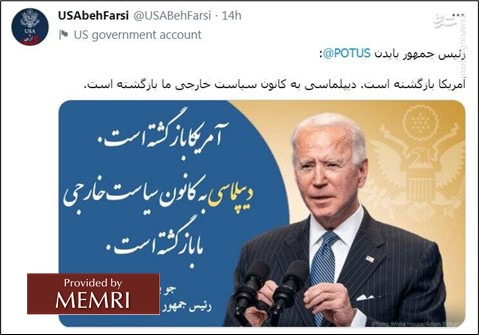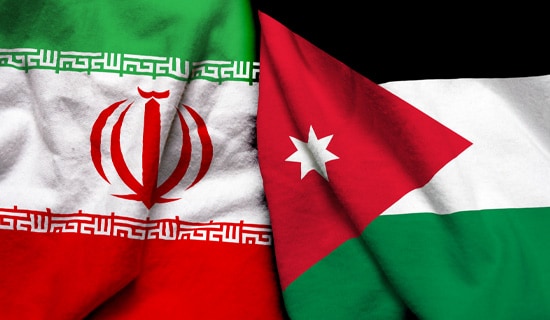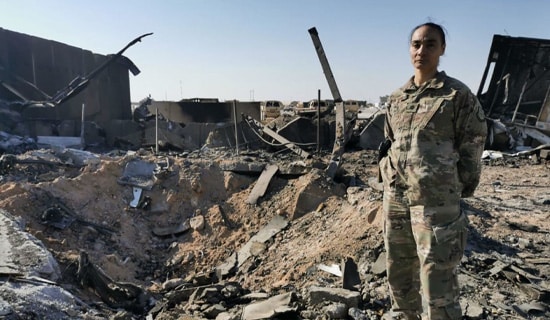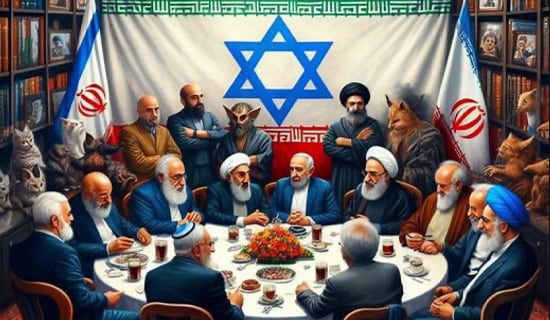Introduction
As the negotiations in Vienna on a U.S. return to the 2015 JCPOA nuclear deal reach an impasse, Iranian regime spokesmen are reiterating that the roots of the disagreement lie in the fundamental U.S.-Iran disputes. The main point of contention is Iran's demand that the U.S. lift all its sanctions on it – not just the nuclear sanctions but also all those pertaining to Iran-sponsored terrorism and Iranian human rights violations.[1]
For example, the Iranians demanded that the U.S. designation of Iran's Islamic Revolutionary Guard Corps (IRGC) as a Foreign Terrorist Organization be revoked, since the sanctions on the IRGC, which dominates all sectors of Iran's economy and trade, is significantly hampering foreign elements' trade with Iran.
In a March 10 speech to members of the Assembly of Experts, Iranian Supreme Leader Ali Khamenei said that Iran must not compromise on its positions in the negotiations. He confirmed, for the first time, that Iran's expansion in the Middle East, which he called "a form of military power," is Iran's "strategic depth," and defined Iran's nuclear program – "the scientific aspect" – and Iran's expansion in the region as the "arms" of Iran's "power" that must not be relinquished in the talks with the U.S. on the lifting of sanctions. Thus, Khamenei in effect stated that Iran's Islamic Revolutionary Guard Corps (IRGC) must not be hobbled in the region, contradicting the U.S. demand in the negotiations that Iran commit publicly to refrain from escalating events in the Middle East.
Iranian regime spokesmen are reiterating Tehran's position that the key to arriving at an agreement with the U.S. is for Washington to simply agree to all Iran's demands in the negotiations. This report will review Iran's position and the threats against the West that it is making in an attempt to force it on the U.S. and its allies in the region.
The Iranian Regime's Position: Expanding The JCPOA From An Arms Control Agreement To An Economic Agreement
The regime spokesmen are blaming the U.S. and stating that its "unreasonable" position is thwarting the talks. Iran is demanding that Washington accept – and anticipating that it will accept – the Iranian position in full, including in all elements pertaining to the lifting of all the sanctions, not just those concerning the nuclear issue and those levelled by President Trump, but also those concerning sponsorship of terrorism and human rights violations levelled by Congress. It is also demanding the lifting of the sanctions on the IRGC and the rescinding of its designation as a Foreign Terrorist Organization. Furthermore, Iran is demanding American guarantees that it will not withdraw from the JCPOA a second time, either through obligating all future presidents or, to circumvent the Americans' claim that there is no way to dictate the policy of future presidents, through obligating the leaders of the House and Senate.[2]
Iran's insistence that the sanctions be lifted is in fact aimed at upgrading the 2015 JCPOA, which removed only the nuclear sanctions on Iran because Iran refused to discuss its human rights and terrorism issues. Thus, it seeks to include the lifting of all sanctions in other areas. It should be emphasized that a few months after the JCPOA was concluded, in July 2015, the Iranian leadership realized that the elimination of only the nuclear sanctions was not going to bring investors back to Iran, and therefore Supreme Leader Khamenei demanded that all sanctions be lifted. Since then, Tehran has continued to insist on this demand and to brandish it at President Biden, who had announced prior to the opening of the negotiations that he intended to bring the U.S. back into the JCPOA. (See MEMRI Inquiry & Analysis No. 1196, Iranian Supreme Leader Khamenei's Letter Of Guidelines To President Rohani On JCPOA Sets Nine Conditions Nullifying Original Agreement Announced July 14, 2015, October 22, 2015.)
By raising Khamenei's October 2015 demand to lift all the sanctions, Iran is seeking to expand the agreement from one concerned solely with arms control into an economic agreement, due to Iran's difficult economic circumstances. Iran wants now to secure benefits that will allow it to trade with other countries, and thus is leveraging the U.S.'s 2018 withdrawal from the JCPOA in order to obtain an agreement and conditions that are better for it. This is in addition to its firm demand that the International Atomic Energy Agency (IAEA) close its investigation of suspicions that Iran is conducting undeclared military nuclear activity.
The regime mouthpiece Kayhan, which is critical of the JCPOA, wrote on March 9, 2022 that Iran must make sure that it benefits economically from a U.S. return to the agreement. It stated:
"The central and most important point is the issue of guarantees. When there are no guarantees, and when the American administration can pull out of the agreement whenever it wants, it means that we are facing an agreement that is half-baked and rickety.
"Such an agreement will lead to two parallel economic losses for the country. It means, first and foremost, [that we must] strengthen [our] condition [that the agreement in Vienna will strengthen] the country's economy. The next negative point is that when an agreement has no genuine and practical guarantees, what foreign country or company will be willing to enter into serious economic projects [long-term investments] with Iran? There are several pieces of evidence indicating that our rival [the U.S.] is insisting on ignoring the issue of verifying [that the sanctions have indeed been lifted], which is one of [Iran's] important red lines to ensure that Iran will benefit economically from the revival of the agreement!
"The importance of the issue of clarification of the facts lies in the fact that we know for certain that the Americans are looking to revive the agreement without any effective and ongoing economic benefit for Iran."[3]
Khamenei: "Our Involvement In Regional Issues Is Our Strategic Depth; It Is A Means Of Strengthening The Regime, And A Form Of Military Power"
In a March 10, 2022 public address, Supreme Leader Khamenei revealed Iran's involvement in other countries that is aimed at strengthening the Iranian regime, and said that this involvement constitutes Iran's "strategic depth." He stated:
"Our involvement in regional issues is our strategic depth. It is a means of strengthening the regime, and a form of military power. Why should we lose it, when we can and should have it?
"Some people say that we should put aside the nuclear issue, because it has evoked such sensitivities. The nuclear issue is a scientific issue. It is about scientific progress and our future technology. Soon – it will not take long, just a few years – we will need the product of this nuclear energy, and in full scale.
""People are talking about making concessions to America or others in order to become immune to the sanctions. This means severing this arm of our policy and this bargaining chip, so that, God forbid, they won't slap us with sanctions if we display toughness. I believe that these [compromises] are mistakes."
"If, over the years, the people who want to chop off some of those arms of power had been given permission to do so, our country would be facing great danger today..."
SUPPORT OUR WORK

To view Khamenei's statements on MEMRI TV, click here or below:
IRGC-Affiliated Mashregh News Website: "The West's Last Chance Is The [IAEA] Board Of Governors Meeting – If At This Meeting The False Dossiers And Accusations [Against Iran] Are Not Closed, [Iran's] Enrichment [Of Uranium] To 90% Will Be Closer Than Ever"
Against the backdrop of the crisis in the Vienna negotiations, the ideological IRGC-affiliated Mashregh News website published an analysis titled "An Agreement Awaits The Political Will Of The Western Sides: The Options [That Iran Is Facing] In The Vienna Talks Dossiers." The analysis included threats:
-
The possibility that the Iranian negotiating team will not return to the talks, and that the West will settle, in the best case, for a temporary agreement
-
If the U.S. rejects Iran's demands by the June 6-10, 2022 IAEA Board of Governors meeting, Iran will begin manufacturing 20%-enriched uranium metal and will increase enrichment to 90%.
The analysis also set out Iran's demand for economic benefit as a condition for it to agree to a U.S. return to the JCPOA. The following are the main points of the Mashregh analysis:[4]
"Now or never – this was the phrase uttered by a senior Iranian diplomat to the Reuters news agency. This approach by a political element to the deadline of the talks includes signs that can be understood: If the West does not manage to bring itself to a reasonable realization, the negotiations portfolio may be locked forever.
"But why is Tehran setting conditions for continuing the talks? The answer to this important question is connected to the outcome of the last round of talks, at the Coburg Hotel [in Vienna].
"After the Iranian negotiating delegation returned to Vienna, two important meetings took place between Iran and the European troika, in addition to the regular meetings between the sides. At these meetings, the Iranian delegation emphasized that the Western sides must make swifter decisions in order to resolve several outstanding issues.
"In the current circumstances, the progress of the Vienna talks has reached a stage at which, in order to sign an agreement, the Western side must make a political decision and show good will. At the same time, surprisingly, instead of facilitating the talks, the Europeans planned, and put on the table, a platform that not only fails to provide Iran with the basic [economic] benefits that were included in the JCPOA, but also diverts the atmosphere of the talks from the [correct] path.
"If the talks do not return to their desired path, it will indicate their end in their current format. The end of the talks will attest to the irresponsibility of the European side with regard to reaching an agreement. While in the previous eight rounds of talks, three separate working groups focused on resolving the legal and technical questions, the repeated opening of several old and unproven dossiers [regarding suspicions of Iranian military nuclear activity] shows that the Americans lack the necessary political will for an agreement! While outwardly the Western media and its supporters in Iran beat, day and night, [the drum] of 'reviving the agreement,' and promote diplomacy in Farsi publications [a reference to U.S. Farsi-language posts online], they are in fact looking for a pretext for creating an international consensus for the revival of the [U.S.] 'maximal pressure project' [against Iran].

Tweet by "USAbehFarsi," the U.S. Department of State's Twitter account in Farsi, of President Biden's statement "America is back. Diplomacy has returned to the backbone of our foreign policy." Source: Mashreghnews, March 3, 2022.
"The introduction of claims from outside the agreement [that are unconnected to the JCPOA, apparently a reference to the issues of Iran's missiles and expansion in the region] into the existing equations in the negotiations has brought us to a phase in which the path for arriving at an agreement is in doubt. In other words, if the Western side stops looking for excuses and complies with Iran's reasonable demands (the lifting of the sanctions, verification [of their removal], and a guarantee [that the U.S. will not withdraw from the agreement in the future]), the agreement will easily be achieved. Otherwise, the Iranian negotiating team will put an end to the negotiations, and will leave Vienna forever."
"What Has Left Iran's Scientific And Nuclear Industry Standing To This Day Is... Iran's Insistence On Preserving The Research And Development Process"
"... Since the Westerners lack the political will for talks, they are trying to accuse Iran, so as to pretend that Tehran is the obstacle to the signing of the agreement. Because the Biden administration does not have the authority it needs from Congress [to do so], it has gotten into trouble, and is suffering from political dementia.
"These days, Washington has begun to accuse Iran of responsibility for the failure of the talks. The Westerners think that opening political dossiers [against Iran] in the IAEA, keeping a blacklist of sanctions, and not giving guarantees will lead to an Iranian retreat under the pressure.
"If the next talks in the eighth round in Vienna fail, the West will no longer be able to continue from the point at which they stopped, and to engineer them politically. In the best case scenario, they [the West] will be able to hope for a temporary agreement.
"1. An end to the talks without a real outcome and without guarantees for Iran's economic benefit means [that Iran will] automatically advance to manufacturing uranium metal at a level of 20% [enrichment], and a possible increased enrichment to 90%. This scientific process does not violate the NPT! In the event that the opposite side does not meet its commitments, we can cut back our own commitments. The diplomatic path and meeting commitments runs both ways. Iran will not march on a one-way path.
"2. The conditions of the American environment [i.e. lack of Congressional support for accepting Iran's demands] shows that it is not possible to arrive at a good agreement with the West. In the event that we cannot arrive at a 'good agreement,' the strategic mistakes made by the previous [Iranian] government [of former Iranian president Hassan Rohani], during the sixth round of the talks, will not be repeated. The country has overcome severe challenges, and now it must not ignore its red lines. In light of the circumstances in the region and internationally, the West is not in a position to seek to set new conditions for the Vienna talks.
"The Wall Street Journal wrote that Western diplomats have expressed apprehensions that, following Russia's military activity in Ukraine and Washington's and Europe's clash with Moscow, disagreements may lead to a weakening of the unity among the superpowers that are participating in the negotiation with Iran (including France, China, Germany, Russia, and, indirectly, America) in all things having to do with [Iran's] nuclear program. The newspaper wrote that at this time, any agreement with Iran is preferable to no agreement. Admissions of this kind show that the West aspires to arrive at an agreement with Iran more than it seeks to exacerbate the Ukraine crisis...
"If the Westerners do not reach an understanding with Iran today on the lifting of sanctions and verification that they have been lifted, in the next round of negotiations there will be no talks on the principle of the sanctions; they will only be able to express their view on the model of Iran's progress..."
"If The Westerners Want To Drag The Talks Down A Rocky Path, They Will Be Shocked By Iran's Domestic Knowledge'
"Experience shows us that the victor is revealed on the last night, and not on the first morning! One of Iran's red lines in the negotiations is obtaining the right to nuclear knowledge in the country. Since the beginning of the negotiations, the Americans have opposed this issue, but Iran's insistence on its natural rights led to the inclusion of this section in the agreement. In the 2015 agreement, the Americans thought that by bringing [Iran's uranium] enrichment to 3.5%, they had impacted Iran's scientific capability – but the development of second-, fourth-, sixth-, and eighth-generation centrifuges, and now, 12th-generation, has lifted us from the ground yet again.
"What has left Iran's scientific and nuclear industry standing to this day is not a graceful gesture by America [allowing Iran] to keep a few centrifuges – but Iran's insistence on preserving the research and development process. If the Westerners want to drag the talks down a rocky path, they will be shocked by Iran's domestic knowledge.
"The West's last chance is the [IAEA] Board of Governors meeting [set for June 6-10, 2022]. If at this meeting the false dossiers and accusations [against Iran] are not closed, [Iran's] enrichment [of uranium] to 90% will be closer than ever to the Vienna negotiating table. In the matter of TESA [Iran's Centrifuge Technology Company, which is sanctioned by the U.S.], Iran has shown enough good will to those who break promises [the U.S. and the West]."
Iranian Spokesmen: The IRGC Must Be Removed From The U.S. Foreign Terrorist Organization List
Kamal Kharazi, chairman of Iran's Strategic Council for Foreign Relations, said in a March 27, 2022 speech at the Doha Forum international conference: "The IRGC must be removed from the list of terrorist organizations, and this is not the only problem. There are over 500 people and entities under American sanctions, and some of them have a direct influence on Iran's relations with the West. The IRGC is a national army, and a national army must not be identified as a terror group. It is very important to the Iranians that the IRGC be removed from this list, but this is not the only issue. There are additional issues – for example, the guarantees [that the U.S. will not again withdraw from the nuclear agreement] and the rest of the issues.[5]

Kamal Kharazi at the Doha Forum; in the background is U.S. Special Envoy for Iran Robert Malley (IRNA, Iran, March 27, 2022)
Iranian Foreign Minister Hossein Amir Abdollahian said, on March 26: "The issue of removing the people [and] the legal [entities] from the red [terror] list and from all the sanctions and unilateral operations that America has leveled against Iran is one of the serious issues in our recent talks in Vienna. When we say people [and] legal [entities], this includes our large economic institutions and large government institutions, and one of these issues is connected to the IRGC... In light of what remains [in dispute] between us and the Americans, I think that an agreement can be achieved if the Americans take a realistic approach...
"The most important issue is still how to remove the people [IRGC members] and the legal institutions of Iran from the sanctions list. Perhaps in a general sense, this is still the issue that is the biggest and most important red line between us and the American side... We are in no way willing to withdraw in the area of our nuclear achievements until we receive a strong commitment, and until our agreement reaches a strong and stable point."[6]

Iranian Foreign Minister Abdollahian (Source: ISNA, Iran, March 26, 2022)
*A. Savyon is Director of the MEMRI Iran Media Project.
[1] As of mid-March 2022, the U.S. and the European countries that are negotiating with Iran in Vienna on a U.S. return to the 2015 JCPOA nuclear agreement had presented Russia to break the stalemate in the talks. This is because of Russia's demand for American guarantees that the sanctions on Moscow will not impact Russia-Iran trade. This demand was accepted by the U.S.
[2] See, for example, statements by Iranian Majlis National Security and Foreign Policy Committee member Ebrahim Rezai detailing Iran's demands and red lines in the talks with the international community. Tasnim, March 10, 2022.
[3] Kayhan (Iran), March 9, 2022.
[4] Mashreghnews.ir, March 3, 2022.
[5] IRNA (Iran), March 27, 2022.
[6] ISNA (Iran), March 26, 2022.




